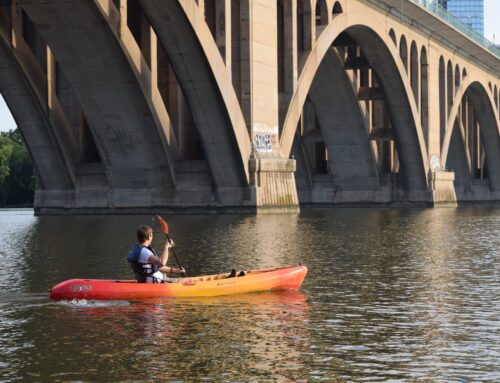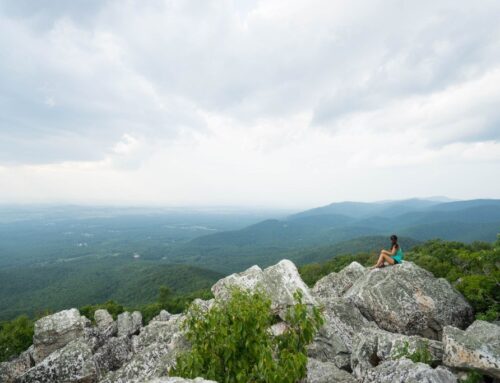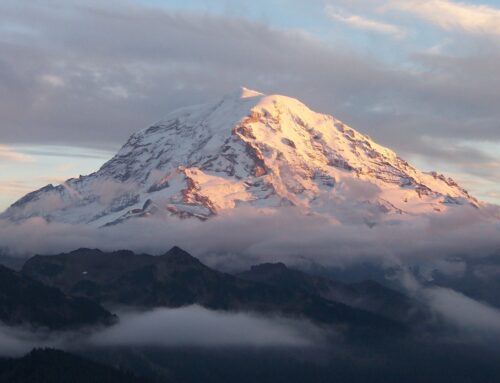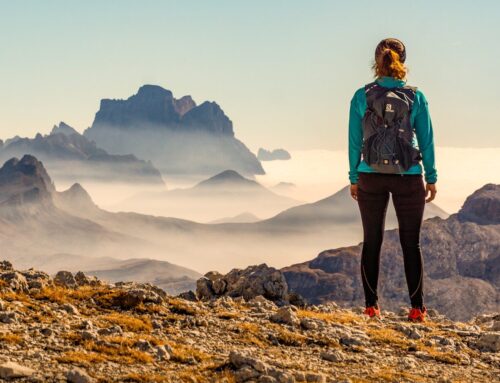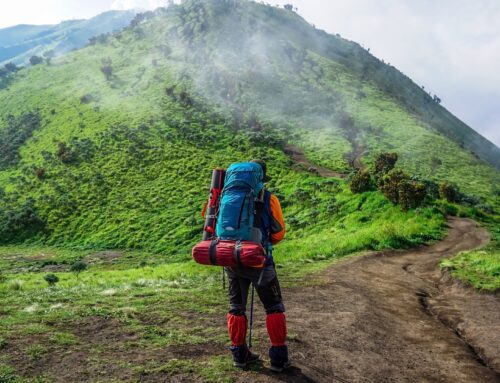Updated June 24, 2021
With its stunning, otherworldly landscapes, Colorado is an outdoor lover’s dream. One of the absolute best ways to immerse yourself in the spellbinding scenery is to go hiking in Colorado, but with so many options, it can be hard to decide where to go! We spent a summer in the mountains of Colorado, hiking basically every day and admiring some of the most stunning landscapes in the country. To help you plan your next big day outdoors, we created this guide to the best hikes in Colorado, with options for hikers of all ability and experience levels.
Before you go, make sure you’ve got a good pair of hiking boots, trekking poles, and a sturdy day pack with all of your hiking essentials. Not sure what to pack along with you? We’ve got a guide for that!
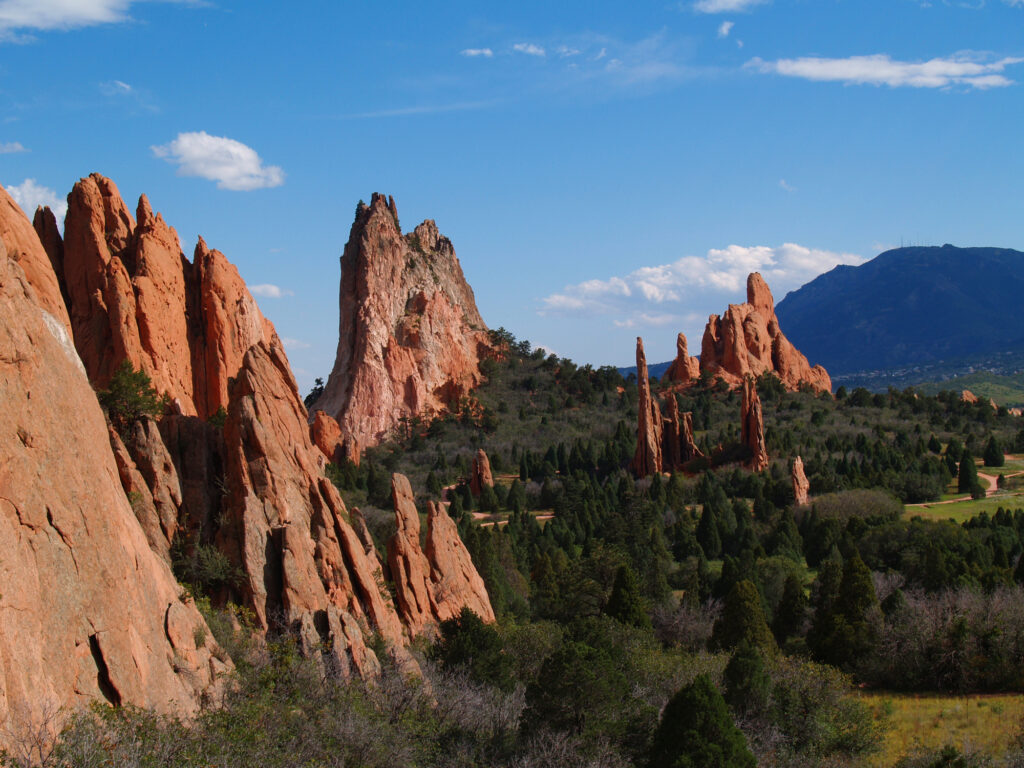
Best Easy Hikes in Colorado
Garden of the Gods Loop Trail
- Trail Length: 3.7 miles
- Elevation Gain: 416 feet
There are few hikes in Colorado that are quite as magical as the Garden of the Gods loop. Located near Colorado Springs, this hike is an easy but jaw-dropping adventure through some of the most spectacular landscapes in the state. Large, red rock formations jut sharply from evergreen forests, sending spellbinding spires of varying heights into the sky. Reds, blues, and greens fill the landscape around every turn, providing a fantastic backdrop for the miles of hiking trails that wind through the park.
Within the Garden of the Gods area, there are tons of short hiking trails that form a network of paths, meaning you can choose your own adventure. One of the most popular hikes here connects the Palmer, Buckskin-Charlie, Niobrara, and Bretag trails to form a ~4 mile easy loop through the park. However, you can easily lengthen or shorten the trek by simply following the trail maps throughout the park to your desired length and distance.
Bonus: many of the paths are paved for access to wheelchairs and strollers, a rarity in the mostly dirt- and gravel-lined paths that constitute most of the hiking trails in Colorado.
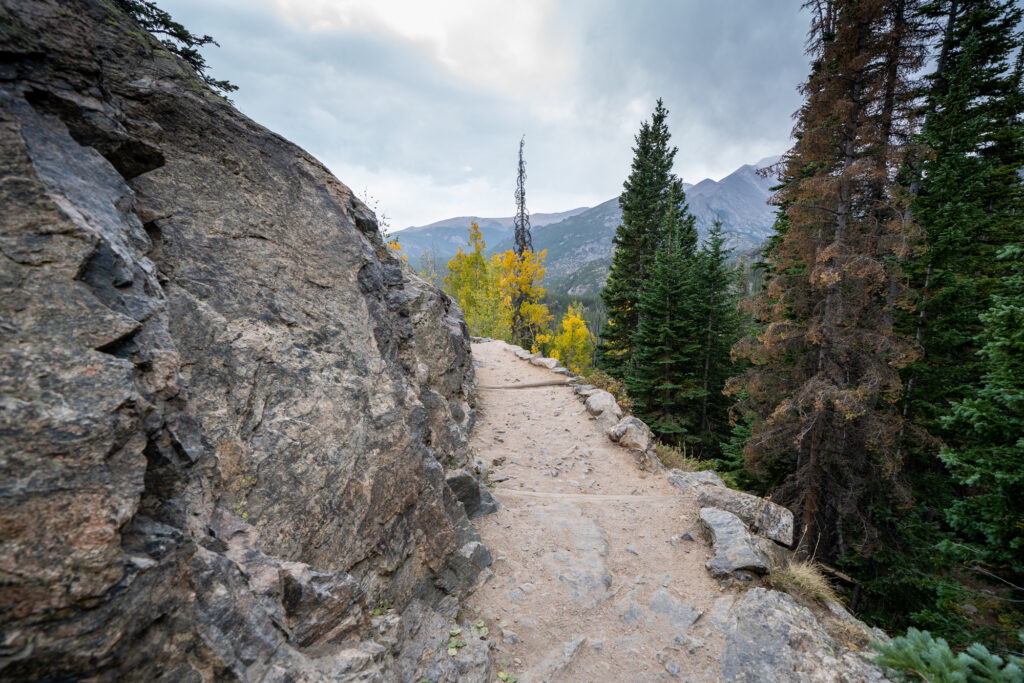
Emerald Lake
- Trail Length: 4.1 miles
- Elevation Gain: 744 feet
Located in Rocky Mountain National Park, the Emerald Lake hike is somewhat of a misnomer, as it actually winds through 5 alpine lakes on the northern side of the park. Each lake is surrounded by stunning peaks and forests, and there are plenty of boulders at each to scramble on or relax and enjoy the views. Our personal favorite lake of all of them was Haiyaha Lake, the most secluded and least trafficked of the four. Don’t cut this one out – it’s well worth the extra mileage to enjoy the solitude and serenity of this pristine, magical alpine waterway.
While there are several ascents and descents throughout this trail, none are particularly steep or technical. Because of the ease of this trail, it’s definitely accessible to anyone willing to do a bit of modest uphill and downhill hiking.
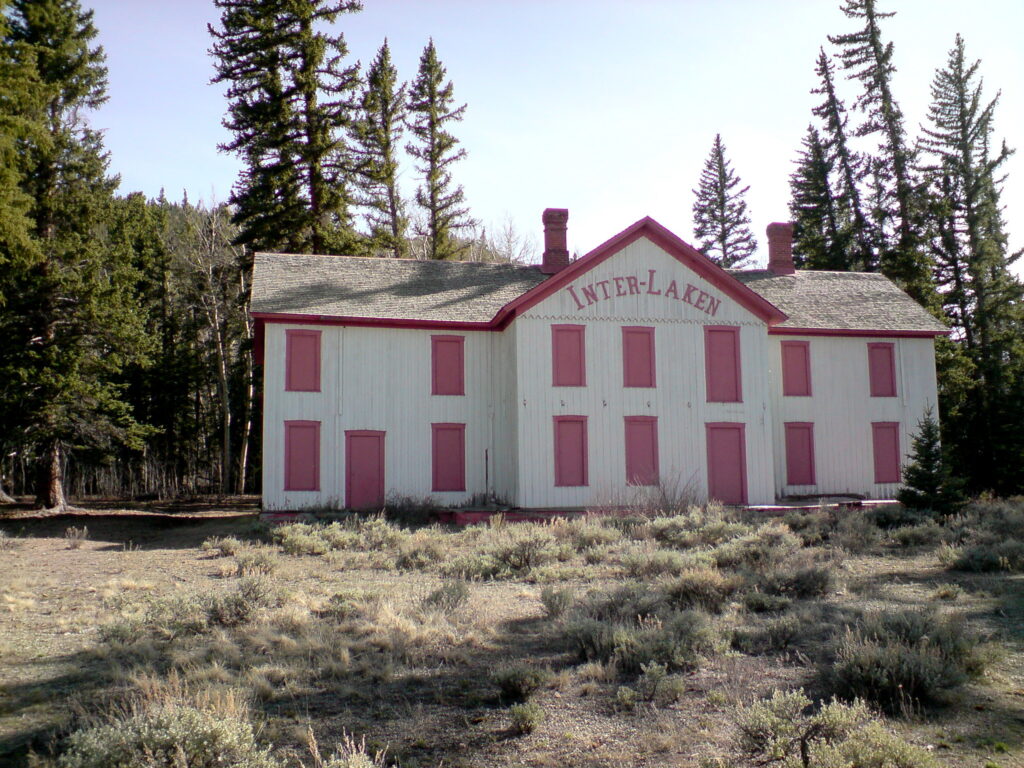
Interlaken Trail
- Trail Length: 4.6 miles
- Elevation Gain: 213 feet
Situated alongside the Twin Lakes in the Aspen area, the Interlaken Trail blends history, tranquility, and stunning mountain views into one easy, accessible 4.6-mile hike. One of the most beautiful easy hikes in Colorado, the Interlaken Trail brings hikers through quiet, forested areas to an abandoned historic luxury hotel, the Interlaken. Because it’s mostly shaded, this is a trail that’s great for hiking year-round, even during sunny summer days, since there’s virtually no area of the trail that’s completely exposed.
If you continue a little ways past the hotel buildings, you’ll arrive at a breathtaking viewpoint with views of the lakes as well as the surrounding mountains of the Aspen area. Locals strongly recommend doing this trail in the fall, when the aspens start to change colors and light up the landscapes nearby.
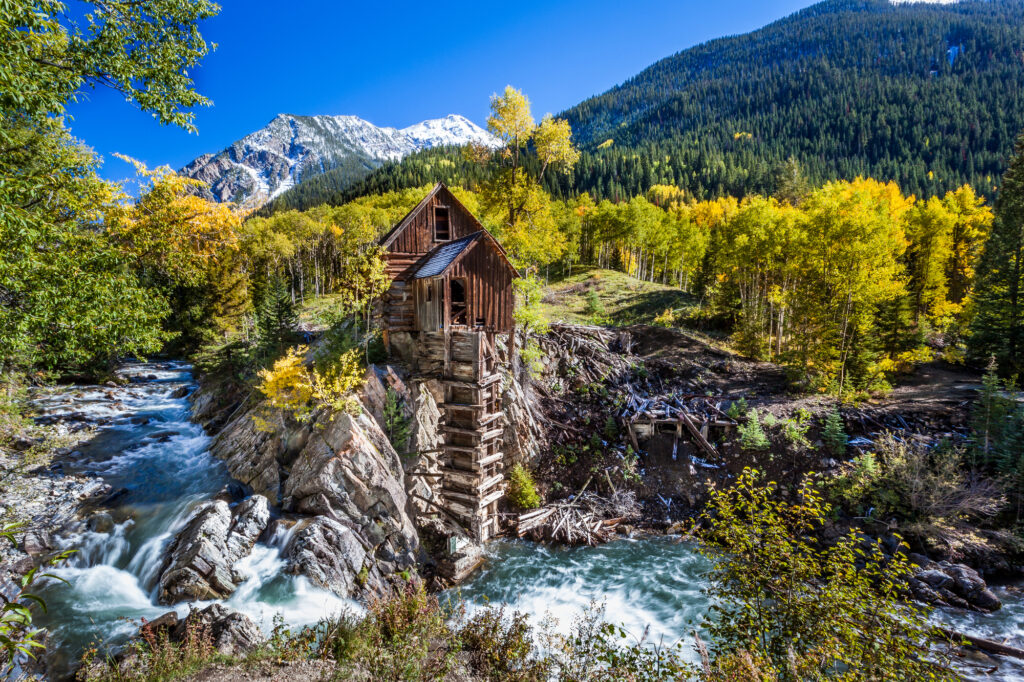
Best Moderate Hikes in Colorado
Crystal Mill
- Trail Length: 9 miles
- Elevation Gain: 1,391 feet
- Recommended Equipment: Trekking poles, swimsuit, quick-dry towel
The Crystal Mill trail is one of the most interesting hikes in Colorado because it combines historic structures, striking scenery, and . It’s one of the most popular trails in the state, but for good reason – it’s one of the most unique and scenic places to go hiking in Colorado. This 9-mile trail takes you along a combination of ATV roads and rocky pathways to an old, abandoned air compression station that was used to power tools and machinery for development of the area. Today, it still stands as a wooden structural tribute to industrial times past, and is a spectacle worth the uphill slog to see.
Beginning the hike, you’ll share a road with ATVs and 4WD vehicles. At the top, you’ll find the mill, which you can see from the trail or pay $10 to enter into the river area and see it from there. If you continue on past the mill, you can reach Crystal City, an abandoned mining town that continues to stand as a ghost town in the mountains. Spooky, historic, and a totally unique way to spend a day hiking in Colorado.
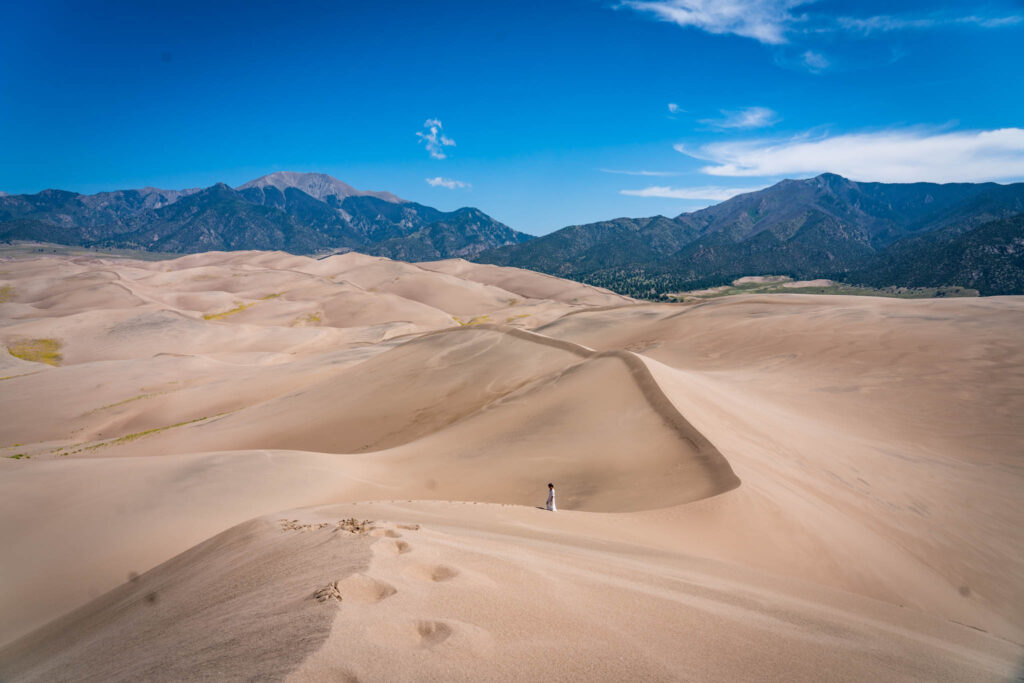
High Dune Trail
- Trail Length: Varies
- Elevation Gain: Varies
- Recommended Equipment: Open-toed hiking sandals
If you’re looking for a place where landscapes collide, Great Sand Dunes National Park is a fantastic example. Sweeping desert sand dunes border blue alpine peaks in this unique national park, and you can get a glimpse of some of the best views in the area by hiking up some of the sand dunes. There are several “trails” people take to hike the dunes, but the reality is that you can simply choose your own path once you arrive. The dunes span for miles and offer plenty of areas to explore, whether you want to spend half an hour or a whole day wandering around.
Note that hiking up sand is hard, so while the elevation gain in the area may not be too bad, the terrain is what adds challenge to this hike. We recommend hiking in sport sandals like these, which won’t get sand stuck in them or weigh you down as you hike around the soft dunes.
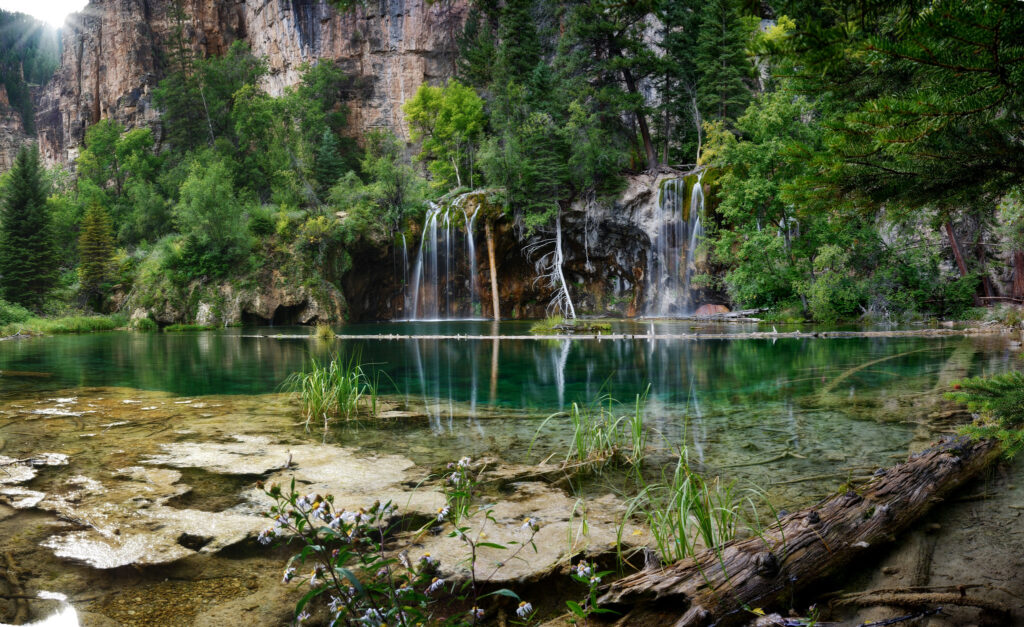
Hanging Lake
- Trail Length: 3 miles
- Elevation Gain: 1,135 feet
- Recommended Equipment: None
**This trail is currently CLOSED due to the Grizzly creek wildfire. Please consult the USDA Forest Service website for most updated information on the status of the trail.
If you’ve ever been to Plitvice Lakes National Park in Croatia, you may find that the landscapes at Hanging Lake look quite familiar. This picturesque lake is located in the White River National Forest, and it’s one of the shortest hikes on our list (perfect for a half-day adventure!). While this trail does get crowded, hikers are sure to find peace and serenity in the beauty of Hanging Lake, with its handful of magical little waterfalls sputtering down from the large, overgrown rocks surrounding the area. It looks like something out of a fairytale!
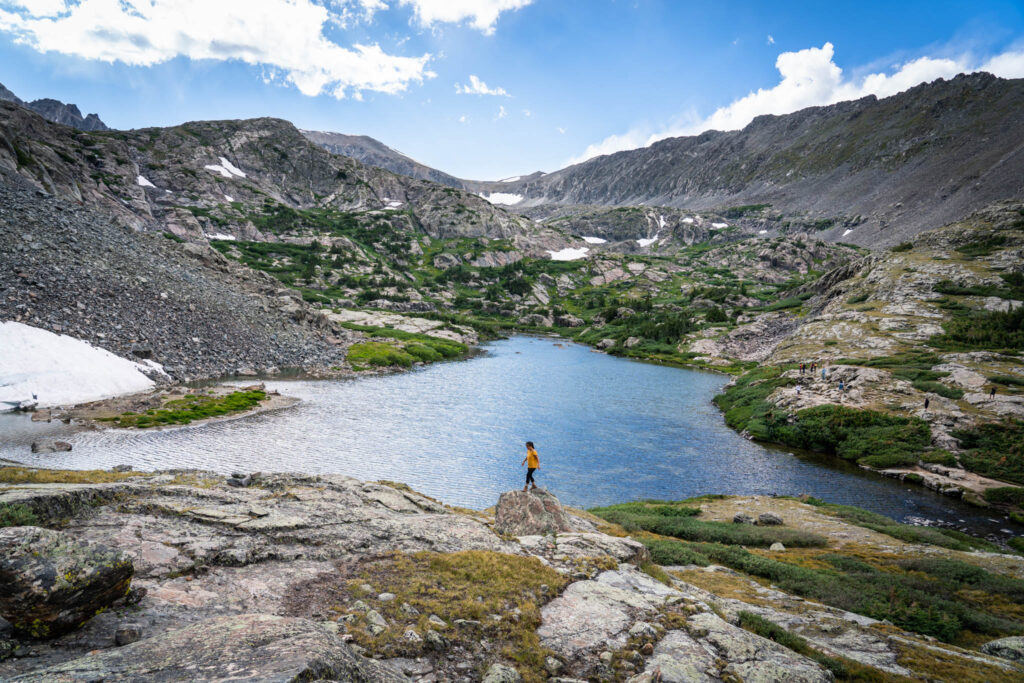
McCullough Gulch
- Trail Length: 6.2 miles
- Elevation Gain: 1,578 feet
- Recommended Equipment: Trekking poles
As one of our favorite trails on this list, McCullough Gulch is perhaps one of the most underrated hikes in Colorado. It’s a hidden gem of a hike located near Breckenridge that has it all: summer wildflowers, powerful waterfalls, alpine lakes, and stunning mountain views. While this trail does require a bit of scrambling, the ascent and descent aren’t too terribly steep, making the magical lake up top to most in-shape hikers willing to get their hands dirty.
Note that the trail does get hard to follow at times, but if you continue to hike/scramble to the source of the waterfalls, you’ll eventually find the lake!
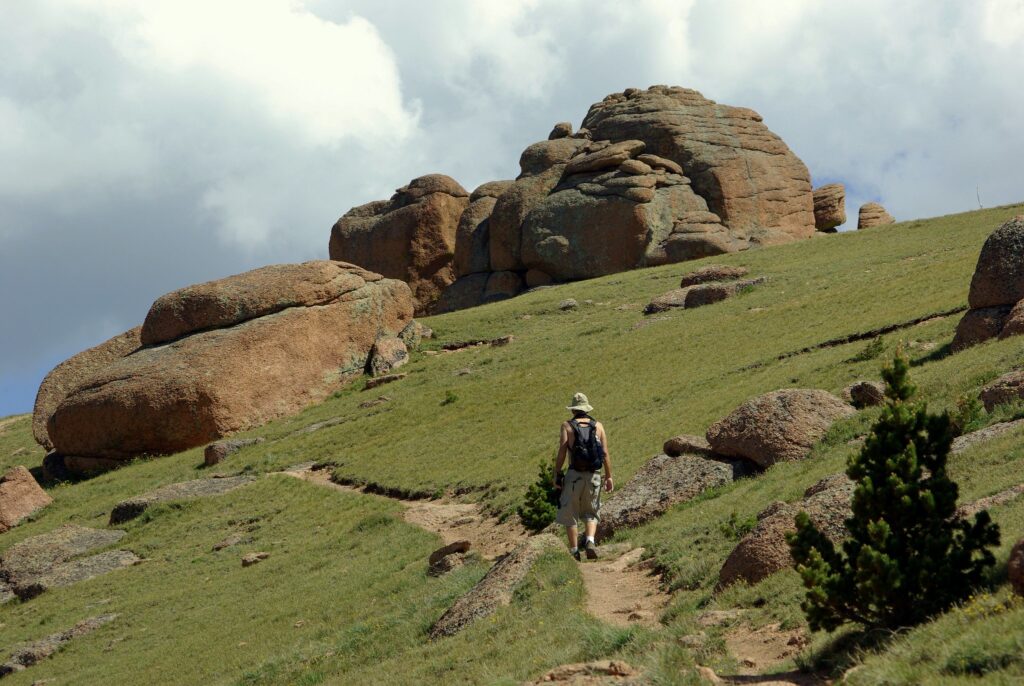
Bison Peak
- Trail Length: 11.8 miles
- Elevation Gain: 3,736 feet
- Recommended Equipment: Trekking poles
One of the strangest and most memorable summit hikes in Colorado is Bison Peak, which has bubble-shaped rock formations in eerie stacks around the entire top of the mountain. The beginning of the hike is a steady incline through alpine meadows, then the second half to the summit gets significantly steeper as you begin to pass these magnificent rocks. Bison Peak is also well known in the area for having frequent wildlife sightings, especially moose, which inhabit the area. Be sure to bring trekking poles for this one, as the trail is gravel and can get quite slippery, especially on the way down!
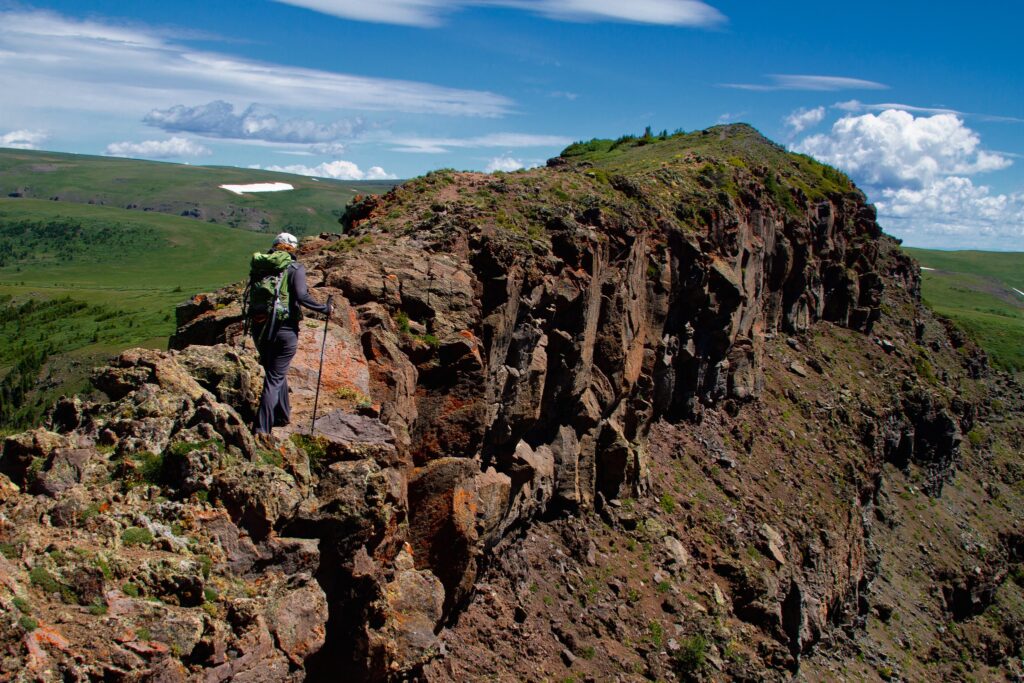
Devils Causeway
- Trail Length: 6 miles
- Elevation Gain: 1,637 feet
- Recommended Equipment: None
One of the most unique landscapes on our list is located at the Devil’s Causeway, a knife-like rock outcropping that trekkers can walk across on one of the coolest hikes in Colorado. With drop-offs on both sides of the trail leading to views of the surrounding valleys, this hike isn’t for people who are scared of heights, but what you give in effort, you gain several times over in the thrill and views accessible from the top of the trail. The hike to the top is moderately challenging, but is certainly accessible to any reasonably fit hikers looking for a unique and stunningly beautiful hike.
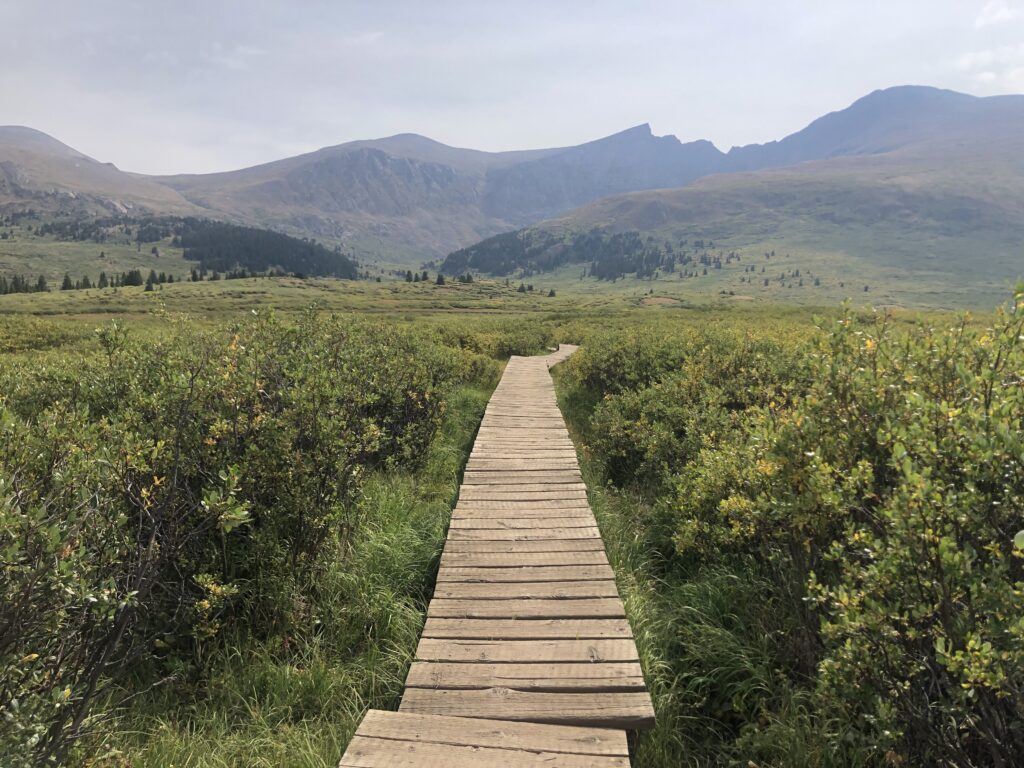
Mount Bierstadt
- Trail Length: 7.5 miles
- Elevation Gain: 2,782 feet
- Recommended Equipment: Trekking poles for descent
Hiking in Colorado is often praised for the sheer number of 14ers, or 14,000+ foot mountain peaks, that are accessible by food. It’s somewhat of a hiker’s rite of passage to complete one or more of these towering peaks. Known locally as the “gateway 14er,” Mount Bierstadt is usually the first peak over 14,000 feet that hikers in Colorado tackle, and while it’s still a fairly challenging trail, it’s certainly the most accessible of the famed summits. This trail takes you up a strenuous but not too steep incline up the side of the mountain. At the very top, you’ll need to scramble to get the rest of the way to the summit.
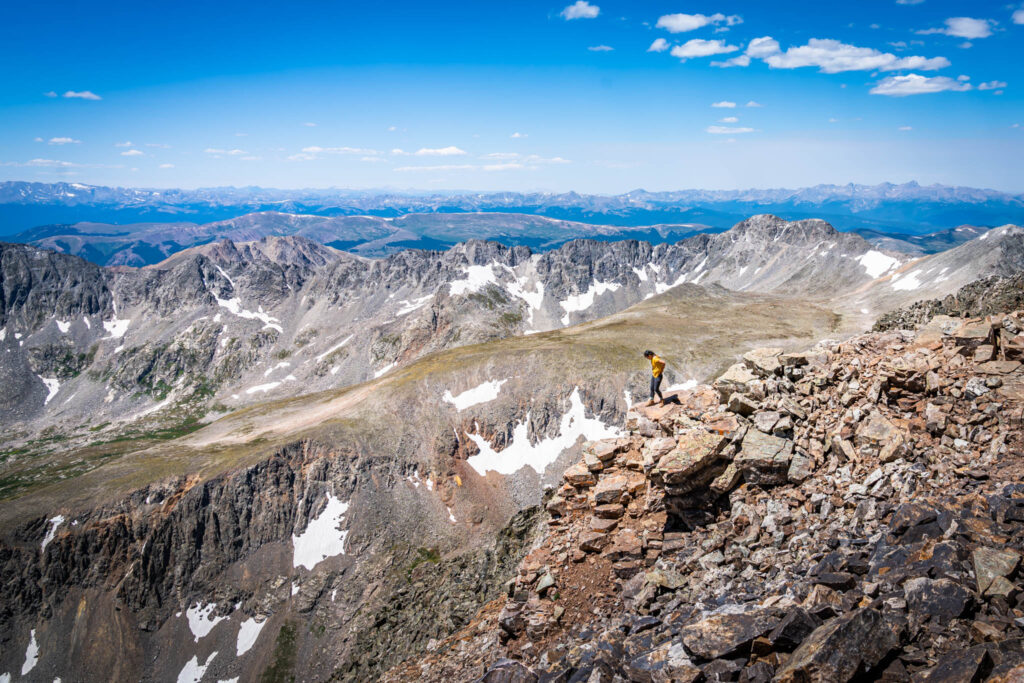
Best Difficult Hikes in Colorado
Quandary Peak
- Trail Length: 7.5 miles
- Elevation Gain: 3,339 feet
- Recommended Equipment: Trekking poles
Another one of the non-technical 14er summit hikes in Colorado is Quandary Peak, which is located near Breckenridge. This challenging hike is quite a bit more difficult than Mount Bierstadt, in our opinion, as the ascent is much more steep, climbing a whopping 1,000 feet in the last mile to the summit alone. While definitely an easier 14er than some of the others that require more technical expertise, Quandary Peak is definitely not for the faint of heart.
Along the way, you’ll enjoy beautiful views of the surrounding valleys and mountains, and you’ll likely run into some friendly mountain goats climbing and grazing nearby. The summit boasts some incredibly spectacular views of the rocky peaks surrounding Breckenridge, as well as the evergreen forests below.
Read More: How to Hike Quandary Peak near Breckenridge, Colorado
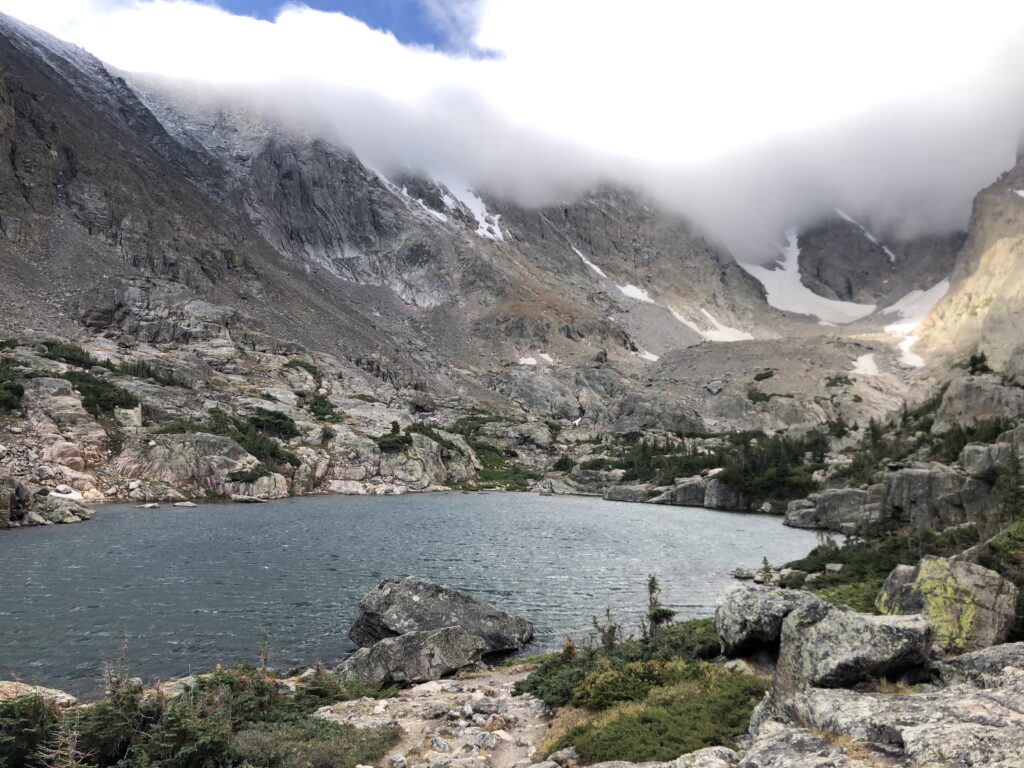
Sky Pond
- Trail Length: 8.5 miles
- Elevation Gain: 1,761 feet
- Recommended Equipment: Trekking poles, hat, gloves, headlamp (for pre-sunrise hiking)
Possibly one of the most gorgeous hikes in Rocky Mountain National Park, Sky Pond is a real stunner of a destination on this 8.5-mile trek. Rocky Mountain National Park is one of the premier destinations for hiking in Colorado, and Sky Pond is one of the most popular trails, so be sure to come on weekdays or before sunrise on weekends to enjoy the trail with fewer crowds and better conditions for taking in the scenery.
After a steady and moderate incline, you’ll eventually hit a very steep rock scramble which takes you past a waterfall to Sky Pond. The views from the top are 360 degrees, with the pond and peaks on one side, and the valleys of Rocky Mountain National Park on the other. Note that Sky Pond can get extremely windy and cold, so we’d recommend several layers and trekking poles to brace yourself should you happen to go on an especially blustery day.
Pro tip: The parking lot for the Glacier Gorge trail is small, so you probably won’t find parking there. If this is the case, you can park in the satellite parking lot and take a bus to the trail head. Be sure to check the times of the shuttle to make sure you can catch a ride back!
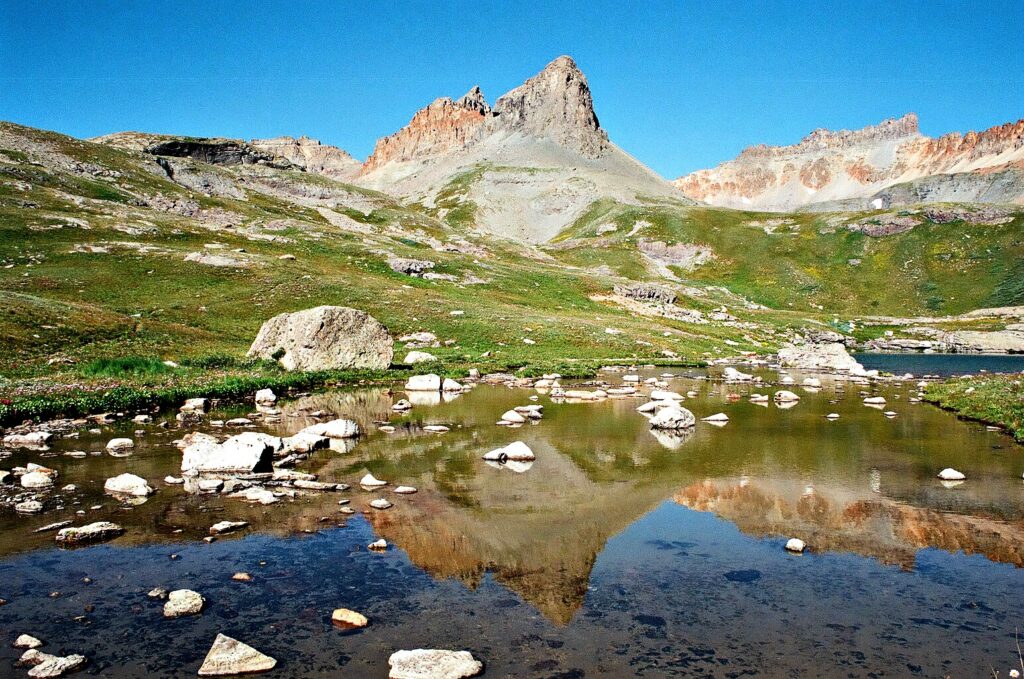
Ice Lakes Basin
- Trail Length: 9.5 miles
- Elevation Gain: 3,113 feet
- Recommended Equipment: Trekking poles
If you’re ready to work your legs for some seriously jaw-dropping views, there’s no better place to go hiking in Colorado than Ice Lakes Basin. Featuring two lakes and access to several other trails in the area, this 9.5-mile, day-long hike features some of the most stunning views of the Colorado Rockies along its steady gravel incline. The last mile or so to the top is the steepest, and you’ll definitely feel the burn as you ascend to these scenic, mirror-like alpine lakes. However, you’ll soon realize the views are absolutely worth the effort, and you’ll be rewarded with some marvelous memories to cherish forever.
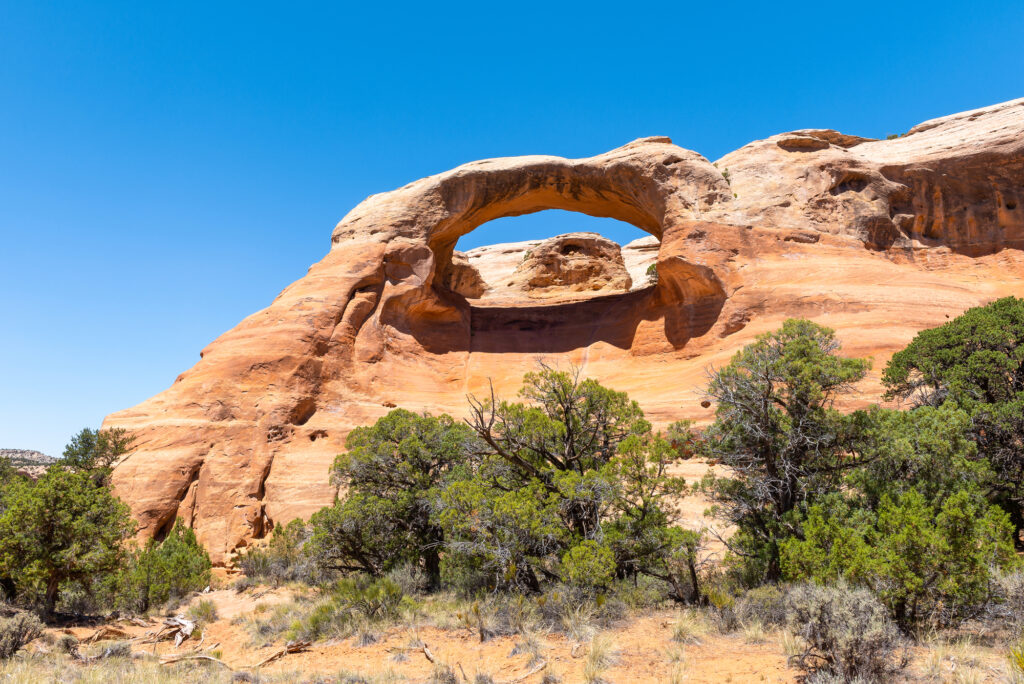
Rattlesnake Arches
- Trail Length: 13.5 miles
- Elevation Gain: 2,444 feet
- Recommended Equipment: None
If you’re itching to take a breather from the high-altitude alpine hikes on our list, the Rattlesnake Arches trail is a fantastic option for you. This day-long hike, clocking in at 13.5 miles, takes you through a desert environment to some spellbinding rock formations, including some rock arches that are perfect for admiring or photographing.
Located in the Black Ridge Canyons Wilderness, avid backpackers often combine this trail with a trip out to the backcountry for stargazing and camping. Note that there isn’t any water available on this long trail, so be sure to pack more than enough to ensure you stay safe and hydrated.
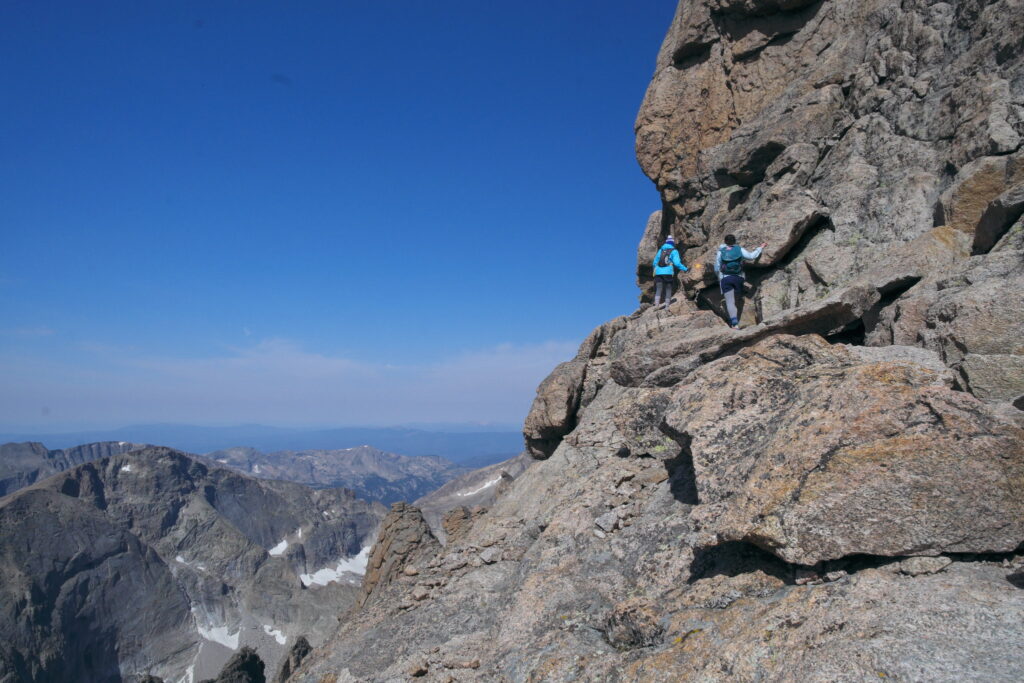
Long’s Peak
- Trail Length: 14.8 miles
- Elevation Gain: 5,039 feet
- Recommended Equipment: Trekking poles,
Note: This hike is for very experienced hikers ONLY. Do not attempt this hike if you are not well-versed in hiking and scrambling in moderately technical environments.
Long’s Peak is a strenuous 14er summit hike that requires some serious physical and mental preparation to conquer. However, if you’re looking for a once-in-a-lifetime hike to work toward or build up to, Long’s Peak is an absolutely magnificent option. In terms of hiking in Colorado, it’s one of the most jaw-dropping and awe-inspiring 14er summits.
The beginning of the hike is a steady, gradual incline across alpine meadows and forest pathways. Once you hit the famed Keyhole, however, it’s a steep and often very windy scramble to the top. Many hikers admit that they had to turn back at the Keyhole due to high winds. However, if conditions are just right, you can continue onward to the summit, which offers really unique and beautiful views of mountains for miles and miles.
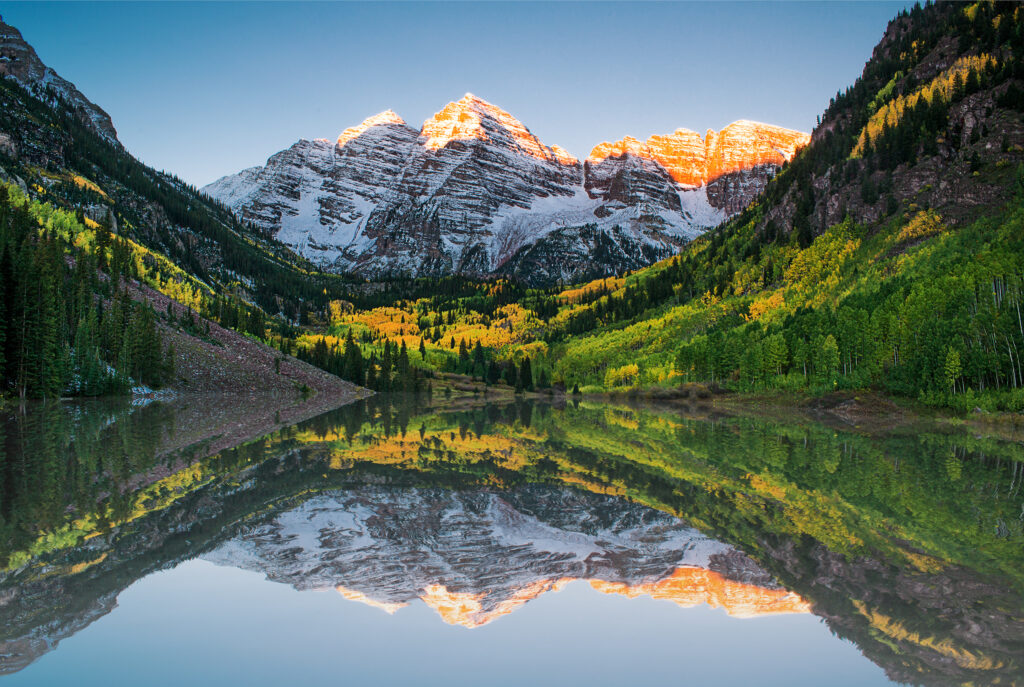
Additional Resources for Hiking in Colorado
What to Bring
- Breathable hiking clothes – For warmer hikes, you’ll want to wear a sweat-wicking shirt and breathable pants, like these Patagonia hiking shorts for men and women. For cold-weather hikes, we recommend dressing in layers, including merino wool baselayers for men and women, a down puffer jacket for men and women, and a Northface waterproof outer shell for men and women (a must for hiking in Seattle). And don’t forget a pair of the best women’s and men’s hiking socks!
- Trekking poles – You won’t need these for every single hike, but we suggest throwing them in your car just in case. We recommend the Black Diamond Trail Ergo cork trekking poles, which are lightweight, easy to transport, and durable.
- Water bottle – Having water available at all times is a huge must. To limit disposable plastic, we recommend bringing your own refillable water bottle. We’re obsessed with Hydro Flask water bottles because they keep water cold for hours.
- Sunscreen and bug spray – Sweatproof sunscreen and DEET bug spray can help you avoid sunburn and bug bites, two of hiking’s most annoying after-effects. Our favorite kind of sunscreen is Sun Bum, as it is free of harsh chemicals and safe for marine life, including coral reefs.
- A brimmed hat or cap – The sun can be brutal in open hikes, so always pack a brimmed hat or cap for day hikes in the sunshine.
- Emergency blanket and first aid kit – We’d strongly recommend bringing a first aid kit and a lightweight emergency blanket on every hike. Why? Because the unfathomable can happen, and it’s always best to play it safe.
- Durable day pack – A durable day pack is the perfect spot to stash all your hiking gear. While any backpack will do, we recommend the Osprey Tempest 20 or the Talon 22 day packs because they’re comfortable and breathable for long hikes. For more information, check out our best day packs for any terrain guide.
Wondering what exactly you should pack for your next hike? Visit our Complete Day Hiking Packing List for our full list and our top gear recommendations.

